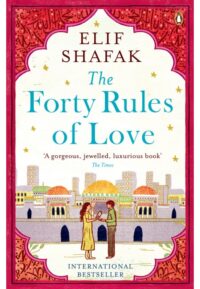Book review: The Forty Rules of Love by Elif Shafak
 I am not a big fan of the novel-within-a-novel device. Invariably I find the secondary narrative either too dull or too abstract to keep my attention, and my interest is only held by the primary story. I found it a little odd, then, that the opposite happened with The Forty Rules of Love by Elif Shafak.
I am not a big fan of the novel-within-a-novel device. Invariably I find the secondary narrative either too dull or too abstract to keep my attention, and my interest is only held by the primary story. I found it a little odd, then, that the opposite happened with The Forty Rules of Love by Elif Shafak.
Ella Rubinstein is a very average, middle-class white American housewife. Now that her three children are almost fully grown she’s got her first job in two decades, reading manuscripts for a literary agency. Her first manuscript is Sweet Blasphemy by A Z Zahara, a historical novel about the real-life 13th century poet and scholar Rumi and the time he spent with Sufi dervish Shams of Tabriz.
The story’s setting and characters are completely alien to Ella but she finds herself getting completely sucked in. To the extent that her relationships to her children and husband change entirely and she begins a secret e-mail correspondence with Zahara that quickly becomes flirty and romantic.
I can relate (to a point) as I also found myself fully absorbed by novel-within-a-novel Sweet Blasphemy. I’ve read a little of Rumi’s poetry and I’m very interested in new historical settings. I didn’t really know anything about 13th century Iran or Sufism. But most of all I was fascinated by Shams.
Shams isn’t exactly a warm and fuzzy person, but compared with many of the people he interacts with, he is moderate, open and accepting. As a Sufi he lives simply and travels between places where he can learn and places where he can teach. His interpretations of Islamic texts are not necessarily popular, particularly among stricter Muslims, but he is well respected by his fellow scholars.
“The Qur’an is a gushing river…for those swimming in it there are four currents…Those who like to swim close to the surface are content with the outer meaning of the Qur’an. Many people are like that. They take the verses too literally…The second one is deeper than the first, but still close to the surface…The third undercurrent is the esoteric, batini reading. If you read the Nisa with your inner eye open, you’ll see the verse is not about women and men but about womanhood and manhood. And each and every one of us, including you and me, has both femininity and masculinity in us.”
I don’t know how much of Sweet Blasphemy is historically accurate (though it does seem like, despite how long ago these events happened, there are multiple first-hand accounts that have survived). But I thoroughly enjoyed the ride.
The English title, by the way, refers to Shams’ 40 rules – all of which are dotted through the novel. They’re religious teachings, but they’re also beautiful expressions of how a good life should be lived. I left this book full of bookmarks and most of them mark pages featuring Shams’ rules.
Unfortunately that’s effectively the subplot. The main plot about Ella really didn’t grab me, and in fact ended up actively annoying me. I found her dull and her story uninteresting.
It’s a shame because I loved the last Shafak novel I read, Honour, and in particular its characters. So I will definitely give her another chance.
Aşk published 2009 by Doğan. This translation published 2010 by Viking.
Source: borrowed from a friend.
One Comments
Comments are closed.